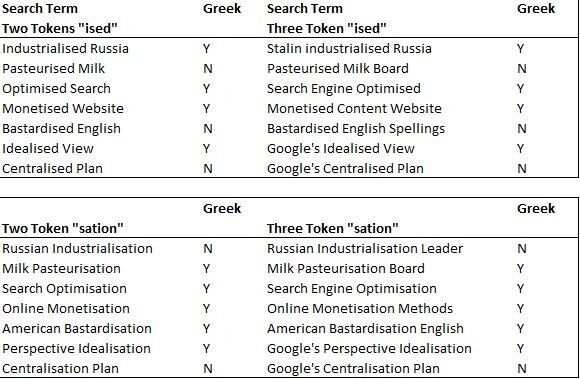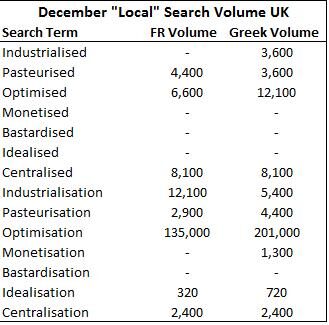(I have a half written blogpost in my head, about ‘deathbait’. When I finally resurrect it, you can smugly point me back to this question.)
Is it just me or are the days of the bucket test now dead?
I was ‘told off’ by a journalist recently for using jargon- laden crap language.., so by bucket test (which was the terminology we used at Yahoo! and I’ve seen it on the outside too) I mean when a small percentage of search users, are deliberately shown a different set of results to most others. Performance criteria such as likelihood of refining query and repeating search, interaction with results, interaction with which result etc. are all closely monitored and then the findings used to inform whatever change may be required.
(You totally knew that anyway.)
Why bother with a bucket test? Anything that seriously impacts the relevancy of the search results (algorithmic or paid) may seriously impact the revenue. When a 1% swing in click-through rate could plus-or-minus millions, you tend to be a bit anal about this.
Lately; it seems like Google in particular, do not bucket test anything for the UK market. Perhaps they test a behaviour in the US and apply the gross learning to the UK (and possibly Australia too, based on another piece of panic-addled conclusion- jumping research I’m halfway through.)
Examples? I’ll give you examples.
Crap results for my location and search intent.
Social/realtime goes live, seems pretty irrelevant, easily gamed.
Palin Pwned
There are others, but the latest one has my interest seriously piqued, as I’m selfish and there is the potential for this harming one of my clients. All credit to the sharp eyed Peter Handley @ismepete who got to work yesterday morning, did a quick check on “search engine optimisation” and to his surprise, found that Google had assumed “search engine optimization”. (Note the ‘Z’ spelling). More on that here: Google Changing Your Search Automatically.
Of course, “search engine optimisation” and “search engine optimization” provide two different sets of results. Don’t know about you, but I’ve been optimising for the “ise” and “sation” spelling of such terms, under the impression that the alternative is an Americanisation and incorrect to boot; (not to mention the client preference, publisher preference and the site content). Sure I’ve dropped a deliberate Zed here and there in the metadata and in Base feeds, but seriously… who is going to ask for a link with the anchor text to a US spelling for a UK client from a UK site. Seriously unprofessional? No? Totally fair game? (I’d like to get @juliejoyce opinion on this as a linkbuilding professional par excellence. )
I was under the impression that both spellings are acceptable, with the ‘s’ form possibly more traditional and correct and that the ‘z’ form is a more modern Americanisation. How wrong I was…
Before getting off on my high unicorn and throwing a mounted strop, I checked a number of resources including Oxford University Press, Cambridge University Press and Wikipedia. Most have a pretty tough copywrite policy, so have a look at the definition linked to here, which I’ll also paraphrase.
Both “ise” and “ize” can be correct in most instances. The American English language was standardised in the 19th Century, with preference to “ize” which seemed to provoke the opposite preference in most other English speaking countries including most of Britain and perhaps even stronger in Australia and New Zealand. “Ize” has its’ roots in the Greek, whereas “ise” is more of a Latin preference, particularly the French. Many UK publishers favour the “ise” form, and there seems to be generalised acceptance that this form is most correct, and the other form is an Americanisation. (Wrong!)
So why are we getting this default assumption in our SERPS now? Is there any pattern I can establish as to which terms get the Greek treatment? I’ve taken some terms at random and performed a pretty basic and manual test. In the interests of being correct, I’ve used FR to denote where the “s” spelling I have used is retained in the results, and I’ve used Greek, where I am presented with “ized” variants by default.
Comments
1. No assumption is made with single token terms e.g. optimise, personalise, realise, actualise, amortisation, optimisation, realisation, pasteurisation, industrialisation. (I tested the shizzle out of this, but please let know if you spot a single token example).
2. Many, but not all two-token terms, force me to view results for the “z” spelling whether my problem term is an “ised” or a “sation”.
3. In both cases (“ised” and “sation”) three token keywords, produced the same results as two- token keywords.
4. “sation” ending keywords produced more instances of the Greek than “ised” keywords.
In an increasingly internationalised culture, I’d argue that the issue of correctness is a moot point. What is interesting to look at, is the volume demand for the Greek spelling and consider that against the preferences in common usage with UK publishers. I tested the volume and most of the two and three token terms had no associated local volume (in the Adwords New Keyword Tool), however with “search engine optimisation” and “search engine optimization” there wasn’t a huge disparity in the local volume. 90,500 searches for the FR form and 74,000 for the Greek. Whilst I have doubts about the accuracy of the local volume data; this is still nothing like the kind of results or the amount of results we would need to make statistically meaningful inferences. That said, I was surprised that the volume demand would be this close. When I tested the single token terms there were more instances of data being available.
Comments
1. In many cases there is no available volume data
2. Where volume data exists; with the exception of “pasteurised” and “industrialisation” the volume of requests for the Greek spelling is either very close to or much greater than the volume of requests for the French spelling.
Conslusion
Though there is very little data available and my little test is by no means exhaustive, it does seem that the volume of demand on such terms might of been the driver of the recent change/test. Perhaps the online community by its’ very nature is already more internationalised and is becomming more so.
Is this really such a big deal?
Maybe not right now, and maybe not for everyone; but if your client is the Milk Pasteurisation Board, or your client offers a personalised engraving service for iPods it could be! Or if you offer conversion rate optimisation, or if you’re on page one for social media optimisation, then I would be seriously considering this. If this change is by default rolled out to all possible instances of terms, then that’s yet another thing we will have to factor into the work that we do, and yes that’s what we’re paid for, and yes – we’d get bored otherwise. I think this is most significant because there is a disjoint in the spelling used in demand, and the spelling used in publisher content (for many high-profile and trusted UK publishers and I’m sure – a lot of our clients).
My question to you is this? Do you have client keywords that are or could potentially be effected? Will you be factoring and accomodating this potential change into your work? What will you be doing? I’ve mentioned dropping different spellings into meta data and Base feeds, but would you consider using different spellings for URLs on a new site? Would you use different spellings in visible content? Would you drop these into footer links?
Is this a good time to pre-empt a sea change and optimise for the Greek spellings whilst the competition is less? I’d love to know!







